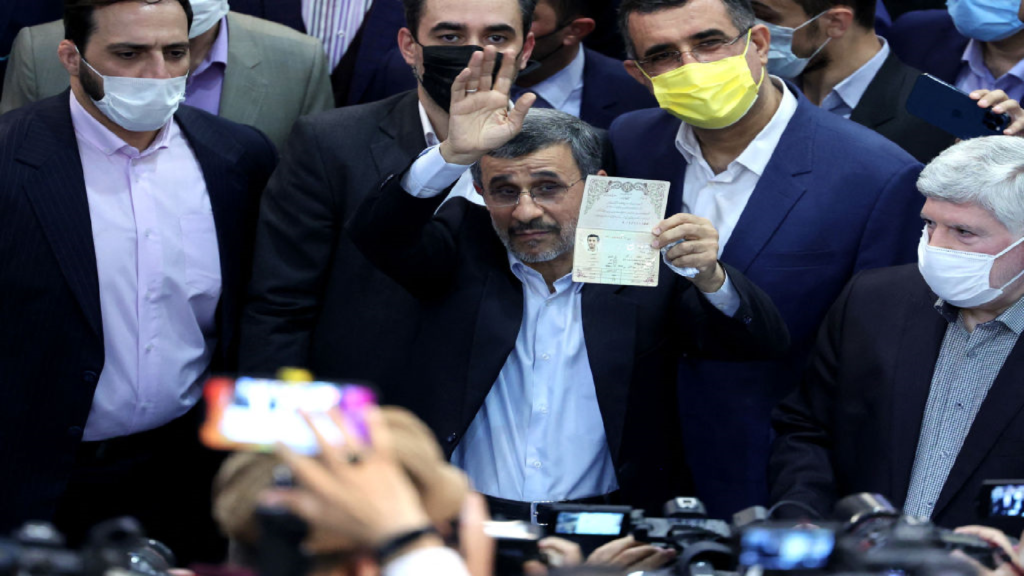Former Iranian President Mahmoud Ahmadinejad on Sunday registered as a candidate in the country's next presidential election following Raisi's death.
Former Iranian President Mahmoud Ahmadinejad has announced his candidacy in Iran's next election following Raisi's death. [GETTY]
Iran's hardline former president Mahmoud Ahmadinejad registered as a candidate in the presidential elections on Sunday, seeking to regain the country's top political position after the death of the country's president in a helicopter crash.
The registration of the populist former leader has piled pressure on Supreme Leader Ayatollah Ali Khamenei, who has openly challenged the 85-year-old incumbent cleric and led authorities to bar him from running in the 2021 elections.
The politician's return comes at a time of rising tensions between Iran and the West over Iran's burgeoning nuclear program, its arms sales to Russia in the Ukraine war and a widespread crackdown on dissent.
Meanwhile, Iran's support for militia proxy forces across the Middle East has come into the spotlight as Yemen's Houthi rebels attack shipping in the Red Sea over Israel's Gaza war.
Ahmadinejad is the most likely candidate to have registered so far, and in a speech after registering he vowed to pursue “constructive engagement” with the world and improve economic ties with all countries.
“Economic, political, cultural and security challenges exceed the situation in 2013,” Ahmadinejad said, referring to the year he left office after two terms as president.
Speaking to reporters in front of more than 50 microphones, Ahmadinejad raised his finger and said, “Long live spring, long live Iran!”
Supporters chanted and waved Iranian flags before the president arrived at the Iranian Interior Ministry. They quickly surrounded the 67-year-old president, chanting “God is great!”
Elections are scheduled for June 28 to choose a successor to President Ebrahim Raisi, a hardline protege of Khamenei, who died in a helicopter crash in May along with seven others.
Former parliament speaker Ali Larijani, a conservative with strong ties to Iran's relatively moderate former President Hassan Rouhani, has already registered, as has Abdolnaser Hemmati, the former governor of the Central Bank of Iran, who is also running in 2021.
It's unclear who else might run. The country's acting president, Mohammed Mokbel, a former backroom bureaucrat, has already been seen meeting with Khamenei and may be the front-runner. Reformist former president Mohammed Khatami has also been mentioned as a possible candidate, but, like Ahmadinejad, whether he will be allowed to run is another matter.
The five-day registration period ends on Tuesday and the Guardian Council is expected to announce a final list of candidates within 10 days, allowing for a condensed two weeks of campaigning before the vote in late June.
Ahmadinejad served two four-year terms in office from 2005 to 2013. Under Iranian law he is eligible for reelection four years after leaving office, but he remains a divisive figure even among hard-line Iranians. His 2009 reelection sparked massive protests by the Green Movement, which were brutally cracked down on in which thousands were detained and dozens killed.
Abroad, he has become a satirist of what the West sees as Iran's worst traits, having questioned the Holocaust, insisted there are no gays in Iran and suggested Iran could build nuclear weapons if it wanted to.
But Ahmadinejad remains popular among the poor because of his populist approach and housing-building programs. Since leaving office, he has increased his profile through social media and written widely publicized letters to world leaders. He has also criticized government corruption, even as his administration faces corruption allegations that have seen two former vice presidents jailed.
In 2017, Khamenei warned Ahmadinejad that his reelection would lead to a “polarized situation” that would be “harmful to the country.” When Ahmadinejad ran for office in 2021, Khamenei said nothing when the 12-member Guardian Council, a committee of clerics and jurists ultimately overseen by Khamenei, rejected his candidacy. The council has never accepted women or anyone who seeks fundamental change in the country's governance.
The committee could again reject Ahmadinejad, but the election to replace Raisi has yet to produce a candidate who has Khamenei's overwhelming support.

